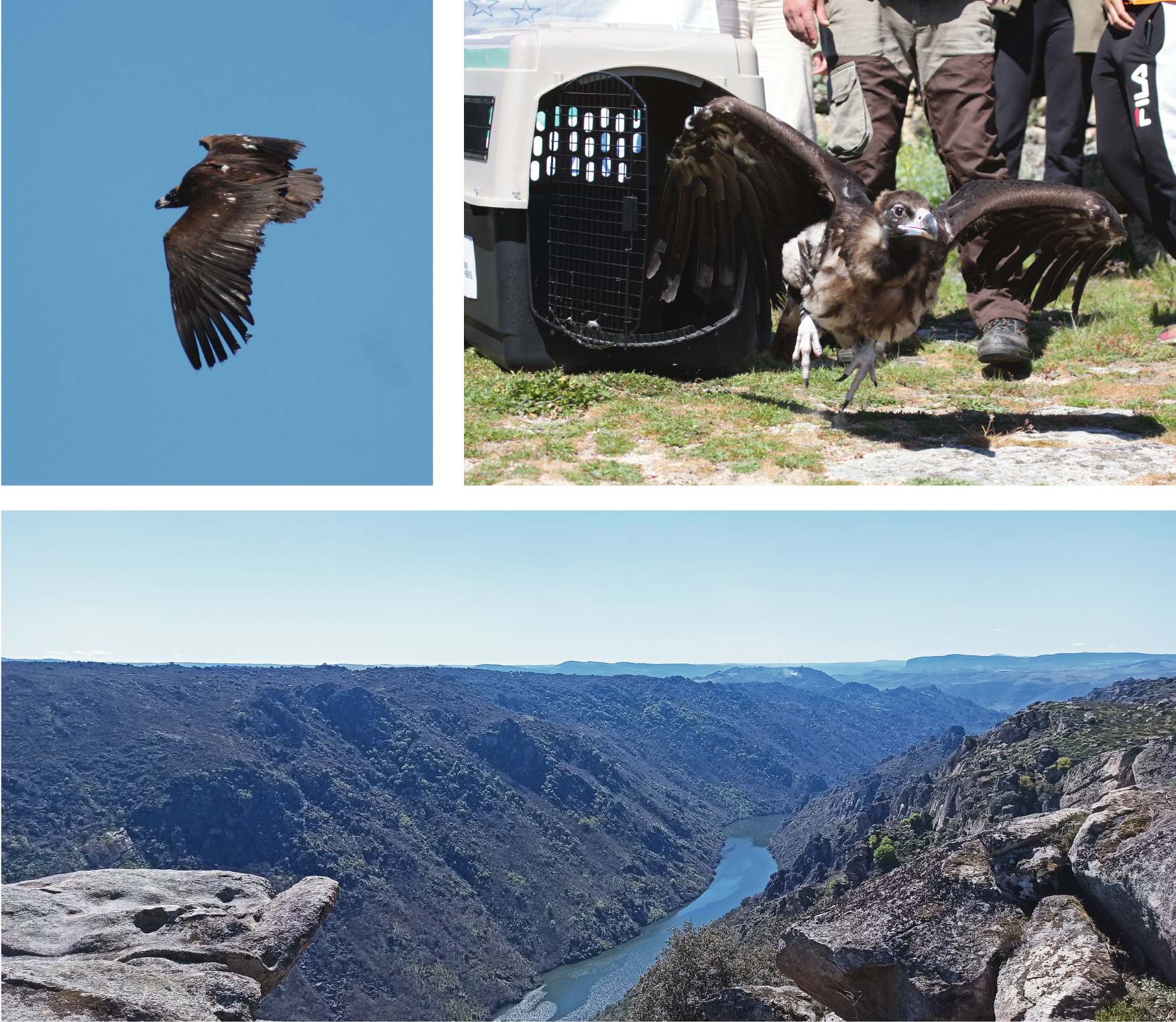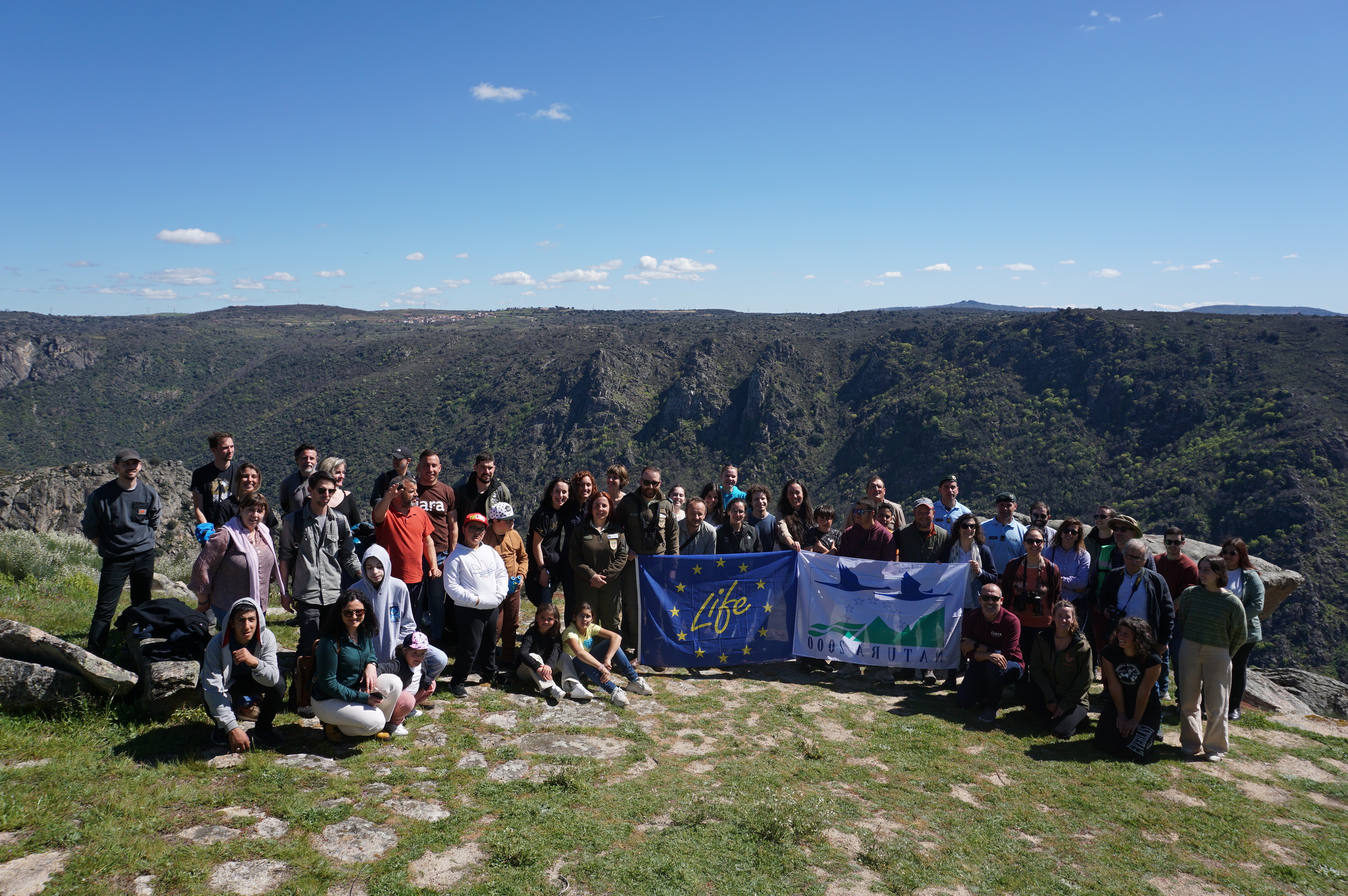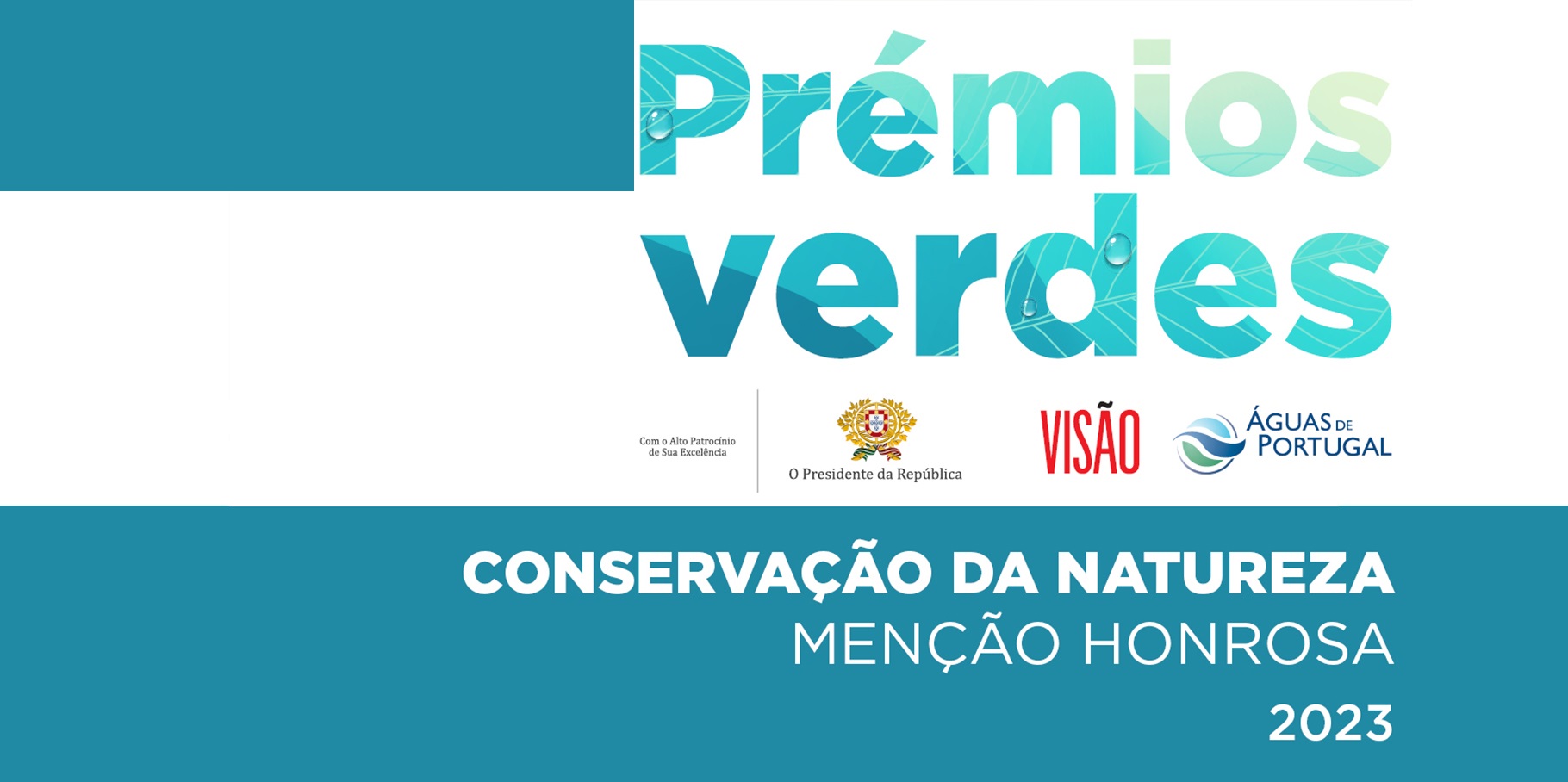24 Mars, 2023
Zimbro, the first black vulture released under the LIFE Aegypius Return project

Zimbro, the Black Vulture returned to the wild on March 21, 2023 © Manuel Nunes
What better way to celebrate the arrival of spring than by returning a bird to the wild? On the 21st of March, Zimbro, a male Black Vulture (Aegypius monachus) was released in northeastern Portugal, after a long rehabilitation process that involved three different wild animal recovery centres. The bird was named after a species of tree (Jimbro), in honor of the International Day of Forests and to highlight the unusual choice that the species makes in the region, choosing to build its nest in juniper trees - something that is not seen in other colonies from the country. Before release, Zimbro was equipped with a GPS transmitter, as part of the LIFE Aegypius Return project, which will allow tracking of its movements over the next few months.
Black Vulture returned to the wild in the International Douro Natural Park
With a breathtaking view over the Douro valley, dozens of onlookers gathered at the Miradouro do Carrascalinho (Freixo de Espada à Cinta) to watch the liberation of Zimbro. Participants were welcomed by Palombar - Nature and Rural Heritage Conservation and the Portuguese team from the Vulture Conservation Foundation (VCF), who presented the LIFE Aegypius Return Project and the collective efforts being made to double the Black Vulture breeding population in Portugal by 2027.
Then, CIARA, represented by the Associação de Municípios do Baixo Sabor (AMBS) and the CRAS-HVUTAD veterinarians involved in Zimbro's rehabilitation, explained the recovery process and highlighted the important cooperation work between the three recovery centers and the national authorities. Among the participants, there were also project partners Transhumance and Nature Association and GNR (SEPNA); nature watchers of the International Douro Natural Park (ICNF); representatives of different municipalities; special education students from the Freixo de Espada à Cinta School Group, who named Zimbro; and people from the local community.
The International Douro Natural Park is home to one of the four breeding colonies of the species in the country. The two pairs that have been breeding for the last few years in the Park area were confirmed again this year and are currently incubating their eggs. The pairs are being monitored by Palombar technicians, who are also prospecting areas with high reproduction potential where artificial nesting platforms will be installed. Running until 2027, the LIFE Aegypius Return project also aims to improve the availability and safety of nests along the border between Portugal and western Spain and, to this end, 120 nesting platforms will be installed and 105 natural and artificial nests repaired.

The release of Zimbro in the International Douro Natural Park © Milene Matos
Increase the black vulture population in Portugal
The black vulture is a species classified as Critically Endangered in Portugal, which was extinct for almost four decades and only returned to nest in 2010, through the natural expansion of the species in Spain. Although the Spanish population currently has around 3,000 breeding pairs, in Portugal there are only 40 pairs, spread over four colonies along the line. The International Douro Natural Park is home to the most fragile colony, with only two pairs, which is why the project partners are committed to reintroducing individuals in this area. By 2027, 20 recovered Black Vultures will be released in the territory using the “soft-release” method, which provides for a period of acclimatization in a structure that will be specifically built for this purpose, before being returned to the wild.
Another important action of the LIFE Aegypius Return project is the study of the behavior and ecology of the species. At least 60 black vultures will be equipped with a GPS transmitter and monitored by the project team. The collected GPS data provides valuable information about the location and the birds and allows them to act quickly in case they need rescue.
With the GPS transmitter that was installed in Zimbro, we will soon be able to share your movements! Will you stay in Portugal or visit the Black Vulture colonies in Spain?

The liberation of Zimbro at the Carrascalinha viewpoint, PNDI © Manuel Nunes, Milene Matos

Group photo after the liberation of Zimbro © Palombar
The LIFE Aegypius Return project

The LIFE Aegypius Return project aims to consolidate and accelerate the return of the Black Vulture in Portugal and western Spain, through the improvement of habitat and food availability, and the minimization of the main threats with training actions for national entities and agents. The project team will implement specific conservation actions in ten Natura 2000 areas along almost the entire border between Portugal and Spain, with the aim of doubling the Black Vulture population in Portugal to 80 pairs in 5 colonies and thus lower the national status of the species from Critically Endangered to Endangered by 2027.
The LIFE Aegypius Return project is co-financed by the LIFE program of the European Union. Its success depends on the involvement of all relevant stakeholders, and on the collaboration of partners, the Vulture Conservation Foundation (VCF), beneficiary coordinator, and local partners Palombar – Conservation of Nature and Rural Heritage, Herdade da Contenda, Sociedade Portuguesa para the Study of Birds, League for the Protection of Nature, Transhumance and Nature Association, Fundación Naturaleza y Hombre, National Republican Guard and National Association of Rural Owners and National Association of Rural Owners Hunting Management and Biodiversity.

Black Vulture returned to the wild in the International Douro Natural Park
With a breathtaking view over the Douro valley, dozens of onlookers gathered at the Miradouro do Carrascalinho (Freixo de Espada à Cinta) to watch the liberation of Zimbro. Participants were welcomed by Palombar - Nature and Rural Heritage Conservation and the Portuguese team from the Vulture Conservation Foundation (VCF), who presented the LIFE Aegypius Return Project and the collective efforts being made to double the Black Vulture breeding population in Portugal by 2027.
Then, CIARA, represented by the Associação de Municípios do Baixo Sabor (AMBS) and the CRAS-HVUTAD veterinarians involved in Zimbro's rehabilitation, explained the recovery process and highlighted the important cooperation work between the three recovery centers and the national authorities. Among the participants, there were also project partners Transhumance and Nature Association and GNR (SEPNA); nature watchers of the International Douro Natural Park (ICNF); representatives of different municipalities; special education students from the Freixo de Espada à Cinta School Group, who named Zimbro; and people from the local community.
The International Douro Natural Park is home to one of the four breeding colonies of the species in the country. The two pairs that have been breeding for the last few years in the Park area were confirmed again this year and are currently incubating their eggs. The pairs are being monitored by Palombar technicians, who are also prospecting areas with high reproduction potential where artificial nesting platforms will be installed. Running until 2027, the LIFE Aegypius Return project also aims to improve the availability and safety of nests along the border between Portugal and western Spain and, to this end, 120 nesting platforms will be installed and 105 natural and artificial nests repaired.

The release of Zimbro in the International Douro Natural Park © Milene Matos
Increase the black vulture population in Portugal
The black vulture is a species classified as Critically Endangered in Portugal, which was extinct for almost four decades and only returned to nest in 2010, through the natural expansion of the species in Spain. Although the Spanish population currently has around 3,000 breeding pairs, in Portugal there are only 40 pairs, spread over four colonies along the line. The International Douro Natural Park is home to the most fragile colony, with only two pairs, which is why the project partners are committed to reintroducing individuals in this area. By 2027, 20 recovered Black Vultures will be released in the territory using the “soft-release” method, which provides for a period of acclimatization in a structure that will be specifically built for this purpose, before being returned to the wild.
Another important action of the LIFE Aegypius Return project is the study of the behavior and ecology of the species. At least 60 black vultures will be equipped with a GPS transmitter and monitored by the project team. The collected GPS data provides valuable information about the location and the birds and allows them to act quickly in case they need rescue.
With the GPS transmitter that was installed in Zimbro, we will soon be able to share your movements! Will you stay in Portugal or visit the Black Vulture colonies in Spain?

The liberation of Zimbro at the Carrascalinha viewpoint, PNDI © Manuel Nunes, Milene Matos
Group photo after the liberation of Zimbro © Palombar
The LIFE Aegypius Return project

The LIFE Aegypius Return project aims to consolidate and accelerate the return of the Black Vulture in Portugal and western Spain, through the improvement of habitat and food availability, and the minimization of the main threats with training actions for national entities and agents. The project team will implement specific conservation actions in ten Natura 2000 areas along almost the entire border between Portugal and Spain, with the aim of doubling the Black Vulture population in Portugal to 80 pairs in 5 colonies and thus lower the national status of the species from Critically Endangered to Endangered by 2027.
The LIFE Aegypius Return project is co-financed by the LIFE program of the European Union. Its success depends on the involvement of all relevant stakeholders, and on the collaboration of partners, the Vulture Conservation Foundation (VCF), beneficiary coordinator, and local partners Palombar – Conservation of Nature and Rural Heritage, Herdade da Contenda, Sociedade Portuguesa para the Study of Birds, League for the Protection of Nature, Transhumance and Nature Association, Fundación Naturaleza y Hombre, National Republican Guard and National Association of Rural Owners and National Association of Rural Owners Hunting Management and Biodiversity.






